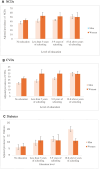Education and non-communicable diseases in India: an exploration of gendered heterogeneous relationships
- PMID: 38785303
- PMCID: PMC11879495
- DOI: 10.1093/inthealth/ihae037
Education and non-communicable diseases in India: an exploration of gendered heterogeneous relationships
Abstract
Background: While the association between education and non-communicable diseases (NCDs) is well established, it remains unclear whether this association varies by gender. The aim of this study was to examine two critical research questions: whether the association of education and NCDs is conditioned by gender and, if so, what are the factors contributing to this?
Methods: Data from the Longitudinal Aging Study in India Wave 1 (2017-2018) was used for the empirical analysis. The study employs bivariate, binary logistic regression and Oaxaca decomposition analyses.
Results: The results reveal that the net likelihood of having at least one chronic NCD increases with an increase in education level for men (<5 y of schooling: odds ratio [OR] 1.18 [95% confidence interval {CI} 1.09 to 1.28]; ≥10 y of schooling: OR 1.43 [95% CI 1.33 to 1.53]). However, for women, the result showed a contrasting pattern. The decomposition analysis revealed that the distinctive roles of marital status and working status in the diagnosis of morbidity for men and women are the key factors behind the gendered heterogeneous relationship of education and NCDs in India.
Conclusions: The study found that it is important to acknowledge the potential impact of self-reporting bias in morbidity data while examining the relationship between education and NCDs.
Keywords: CVDs; India; NCDs; diabetes; education; gender.
© The Author(s) 2024. Published by Oxford University Press on behalf of Royal Society of Tropical Medicine and Hygiene.
Conflict of interest statement
None declared.
Figures




References
-
- Marmot M. Social determinants of health inequalities. Lancet. 2005;365(9464):1099–104. - PubMed
-
- Zimmerman E, Woolf SH. Understanding the relationship between education and health. NAM Perspectives. Discussion paper. Washington, DC: National Academy of Medicine; 2014. Available from: https://apha.confex.com/apha/142am/webprogram/Handout/Paper315693/Final%...
-
- Marmot M, Friel S, Bell R et al. Closing the gap in a generation: health equity through action on the social determinants of health. Lancet. 2008;372(9650):1661–9. - PubMed
-
- Link BG, Phelan J. Social conditions as fundamental causes of disease. J Health Soc Behav. 1995;Spec No:80–94. - PubMed
-
- Weil AR. Tackling social determinants of health around the globe: a global health equity movement relies upon research showing how social factors affect health. Health Aff (Millwood). 2020;39(7):1118–21. - PubMed
MeSH terms
LinkOut - more resources
Full Text Sources

